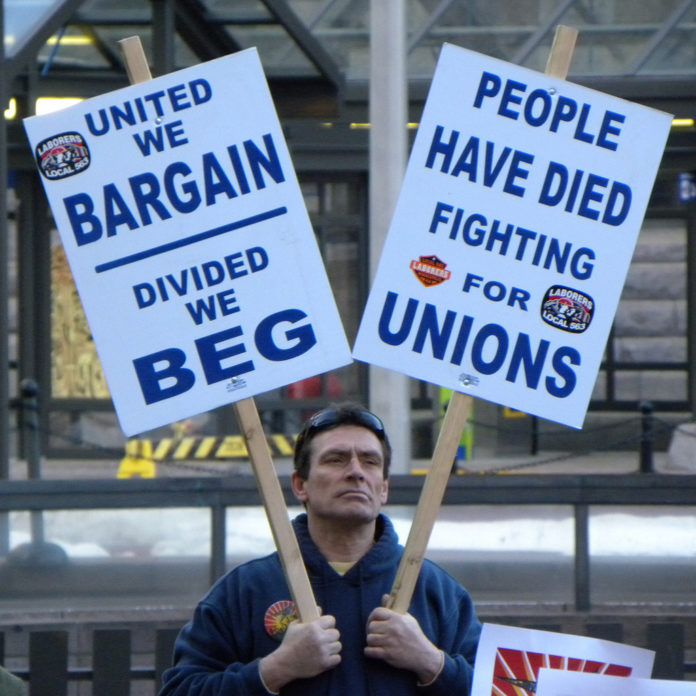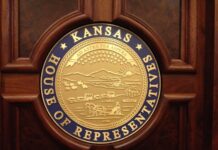The announcement barely caused a ripple in the social media waters.
While attention zeroed in on gubernatorial running mates, state Sen. Laura Kelly quietly lined up support from groups that could play a deciding role in the Democratic primary.
While Kelly’s choice of state Sen. Lynn Rogers as a running mate made headlines, it may be the support that she’s starting to pick up from organized labor that could prove more important over the long haul.
In recent weeks, Kelly won the support of the Topeka transit workers union and the United Steelworkers.
The announcements barely registered a blip on Kelly’s Twitter feed, where the transit workers endorsement was “liked” seven times and the steel workers endorsement was “liked” 20 times.
While those announcements may not have generated much buzz – in social media or mainstream media – they represent a major Democratic voting bloc that could swing the party’s gubernatorial primary in someone’s favor.

“They’re quite significant. They bring a lot of people to the table,” Kelly said recently when discussing the role of organized labor in the primary.
“They not only give the endorsement,” she said, “they also work on the candidate’s behalf to make sure that not only their membership but members of the community know that I’m a candidate they can trust.”
Indeed, the sheer numbers could be significant in a Democratic primary where voter turnout has been low over the years and the candidates don’t necessarily enjoy high statewide name recognition.
Consider that there are 101,000 union members in Kansas, including an estimated 25,000 who belong to the Kansas National Education Association and 30,000 in the AFL-CIO.
Add in the money they can bring to the table coupled with get-out-the-vote efforts and access to membership lists, the unions can wield significant influence in the primary.
“Even though unions have lost a fair amount of power, they still have the ability to get some of their members out to vote,” said Washburn University political scientist Bob Beatty. “I think they have the potential to be a difference-maker in the primary.”

Indeed, all three major Democratic gubernatorial candidates — Kelly, former state Rep. Josh Svaty and former Wichita Mayor Carl Brewer — recognize the importance that unions can play in the primary.
“Josh is working hard to seek support from union leaders and members across Kansas,” said Mike Swenson, Svaty’s top campaign strategists.
“All the major candidates are labor friendly, so our main pitch to Kansas labor is that Josh Svaty is the Democratic candidate with the best chance to be elected in November,” Swenson said in an email. “If we don’t win the election in November, then the issues that are key for labor will not be addressed.”

A similar view was echoed by the Brewer campaign.
“The Brewer campaign is actively seeking out union support,” spokeswoman Stephanie Kohlhoff said in an email. “We’ve already been working to meet with unions and continue looking for more opportunities to meet with them and talk with them about their concerns, whether it be their leadership or their membership.”
While organized labor in Kansas isn’t as big as it is elsewhere – it represents about 10 percent of all Kansas workers – it can still bring some political muscle to bear in a Democratic primary, experts said.
“Even though the union presence in the entire state of Kansas is not that great, concentrating it into the Democratic Party you’re going to have more concentration of that union vote,” said Michael Smith, a political scientist at Emporia State.
“Unions are very good at mobilizing and getting their folks out to vote and the primary is a low turnout election,” Smith said. “That could really make a difference.”
And turnout in the Democratic primary is a big wild card, Beatty said.
“No one knows if Democrats are going to turn out on Election Day,” he said.
Beatty said the highest Democratic primary turnout in the last 24 years was 36 percent in 1994 in a field that included former Congressman Jim Slattery and former Topeka Mayor Joan Wagnon. The Democrats have averaged 20 percent primary turnout in recent years.
A low turnout this year, would only amplify the unions’ influence, he said.
“This is going to be such a relatively low turnout primary that mailers are going to make a difference,” Beatty said.
Several major unions, such as the KNEA and the AFL-CIO, haven’t made endorsements and it’s still uncertain whether they will get involved in the Democratic primary.

Andy Sanchez, executive secretary-treasurer of the Kansas State AFL-CIO, said it was too early to know whether his group would endorse anyone in the Democratic gubernatorial primary.
He wouldn’t rule an endorsement out, however. He said the organization has invited candidates to meet with its labor councils. No decisions have been made, he said.
“We’re looking for people who represent working families, that have a track record of voting for working families,” Sanchez said. “We’re going to continue to vet the candidates.”
Mike Kane, president of the Tri-County Labor Council of Eastern Kansas, said it’s hard to pick a candidate since they’re all “outstanding.”
“I want (a candidate) who thinks about the little guy more than he thinks about the big guy,” Kane said. “I want someone who on Monday says something and a week later they say the same thing.”
The KNEA, meanwhile, hopes to make a decision on whether to endorse by mid-June, said Mark Desetti, the organization’s lobbyist in the Capitol.
Among other things, the KNEA is surveying candidates about their views on issues such as teacher due process, teacher salaries, collective bargaining, tax policy and safe work environments, among other things.
The KNEA has invited both Democrats and Republicans in for interviews, Desetti said.
Maybe 20 years ago, Desetti said, Democrats saw the KNEA’s endorsement as a given because they knew that Republicans wouldn’t support the organization at the statehouse.
“To the extent that they have primaries now, it actually makes it where they do need to talk to us,” Desetti said of the Democrats. “They can’t take our recommendation for granted.”
A conservative-leaning Legislature took steps several years ago to limit the political power of unions by passing a law that barred public-employee unions from deducting money from members’ paychecks to bankroll political activities.
Nevertheless, the KNEA political action committee has still been able to stash away about $250,000 as of the end of 2017, according to the latest campaign finance report.
Kelly has received union support in the past, especially in 2012 when she was in a hot race for re-election in which she defeated former Shawnee County Sheriff Richard Barta.
In that race, Kelly received financial support from unions representing teachers, plumbers and pipefitters, heavy equipment operators, machinists and aerospace workers, and electrical workers.
Emil Ramirez, director of United Steel Workers District 11, couldn’t be reached for comment for this story. But in a statement, he credited Kelly for working in 2017 to reverse former Gov. Sam Brownback’s tax cuts.
“As a four-term state senator, Laura has never flinched in fighting for working men and women and their families, on the job and in the community,” Ramirez said in a statement.
Sarah LaFrenz, president of the Kansas Organization of State Employees, said organized labor would be an important sector because it’s structured in a way so that members network and share information with each other.
“It would be good for candidates to get to know their labor folks, if they can,” she said. “It would be very valuable.”
















